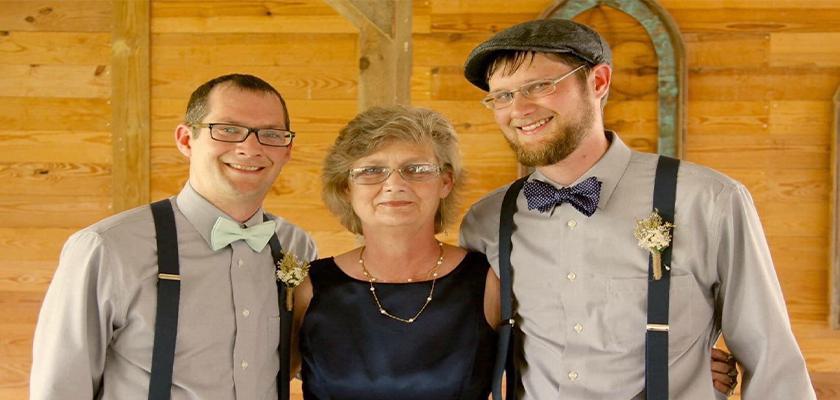New legislation is being targeted in the wake of the ever-evolving case of Casey White. This time, it involves the case he is accused of murder in, the murder of Connie Ridgeway in Lauderdale County.
Connie’s Law would require that judges inform victims of violent crimes and their family members of the location and relocation of prisoners convicted of violent crimes.
“Escapes seem to happen more often than they probably should," said Mark White, a family friend of Ridgeway. "And If a person is a victim, just think about the fear they have that this person can get out and get revenge. It’s real.”
Currently, under Alabama law, if a prisoner is granted a transfer from one facility to another, the judicial office is not obligated to inform victims and their families of the location change. Connie’s Law seeks to compel judges to inform victims and give them an avenue to protest the transfer in court.
The proposed bill is named after Connie Ridgeway and resulted from the experience of her surviving family after Ridgeway’s alleged killer escaped from jail.
Connie Ridgeway was found stabbed to death in her Rogersville apartment on Oct. 23, 2015, after a neighbor requested a wellness check.
Casey White was already serving a 75-year prison term for a string of violent crimes in 2015, two months after Ridgeway’s murder. Five years after being arrested, he allegedly requested a Lauderdale County investigator and provided a written confession of Ridgeway’s murder. According to the Lauderdale County District Attorney, Casey White also reportedly claimed to have been paid to carry out the murder.
Casey White was serving his sentence in state prison when he offered the alleged confession. He was subsequently transferred to Lauderdale Co. and stayed there until his escape on April 29.
White is a former law enforcement officer and long-time friend of Ridgway’s surviving sons, Austin and Cameron Williams. He also founded and runs the webpage Justice For Connie Ridgeway. According to Mark White, the two sons were not made aware of Casey White’s location until after his escape.
“Austin messaged me that there had been an escape, and Casey White was out.” Mark White said. “He told me that [Casey] had escaped from Donaldson [prison], and then in about 30 minutes, he was told that [Casey] actually escaped from Lauderdale County.
“You can’t have families that go through this. And then they think this person who committed this horrible crime is in one place, and they’re actually in another because attorneys and judges don’t have to notify anybody except the next jail.
"Nobody’s in the loop, the victims are not in the loop, and they end up getting re-victimized," said White.
According to Mark White, the fear for victims is they have no way of protesting prisoner transfers or even notifying the judge of any potential family members who may live in the area where the transfer is being proposed.
According to Mark White, the lack of information can be a cause for much anxiety and fear on behalf of those who were victims of violent crimes.
The Williams brothers are not alone in describing incidents in which they felt woefully underinformed about the whereabouts of a violent criminal. Ricki Howard Martin told 1819 News of an incident in which her brother’s murderer was transferred on work release not far from her home. According to Martin, in 2009, her brother was sleeping on his recliner when his daughter’s boyfriend came into his home and shot him four times. The killer was sentenced to life in prison.
Despite Martin’s pleadings with the Alabama Department of Corrections (ADOC) to keep the killer placed further away from her home, he was later transferred to a work-release program an hour away from her home.
“He had been to my house, the boy that shot my brother,” Martin said. “He knew where I lived. And if you can shoot somebody four times in their sleep, that says that you could do that to anybody.
“I had asked ADOC to know wherever he was; they told me they couldn’t tell me. I had to check the website.”
Martin said she had a premonition something was wrong regarding the location of her brother's murderer.
"In 2018, something woke me up: a feeling that something wasn’t right,” Martin said. “So, I got up and checked the website, and he was in Decatur on work release, and I knew nothing about it, and that’s not very far from us.
“These work release programs: they are notorious for escaping.
“I’m afraid of [my brother's murderer], to be honest with you," said Martin. "If he can do that to somebody who’s asleep, he can do anything to anybody.”
Martin wholeheartedly supports Connie’s Law because she believes that other victims shouldn’t have to live in fear.
The proposed bill is without a finalized text or sponsor in the Alabama Legislature. However, both Mark White and Martin think it will have unanimous support from lawmakers.
On April 29, Casey White escaped the Lauderdale Co. Jail, with the assistance of assistant corrections director Vicky White.
Both Vicky White and Casey White were apprehended in Indiana. U.S. Marshals were chasing them and crashed into their vehicle, authorities said. Casey White gave himself up, and Vicky White shot herself and was taken to a hospital, authorities said. Vanderburgh County Coroner Steve Lockyear said she died from her injuries.
To connect with the author of this story, or to comment, email craig.monger@1819news.com.
Don’t miss out! Subscribe to our newsletter and get our top stories every weekday morning.










